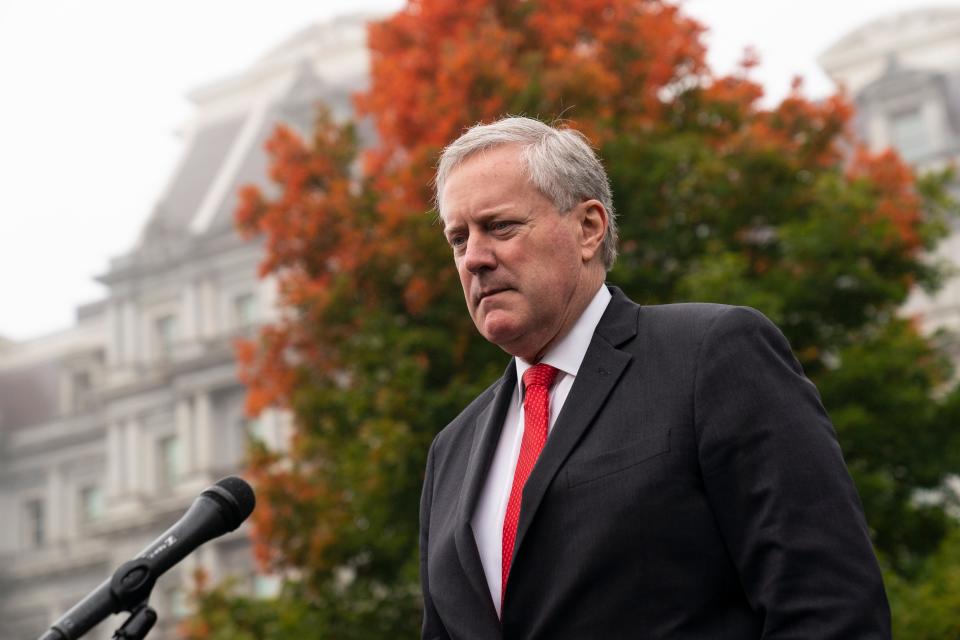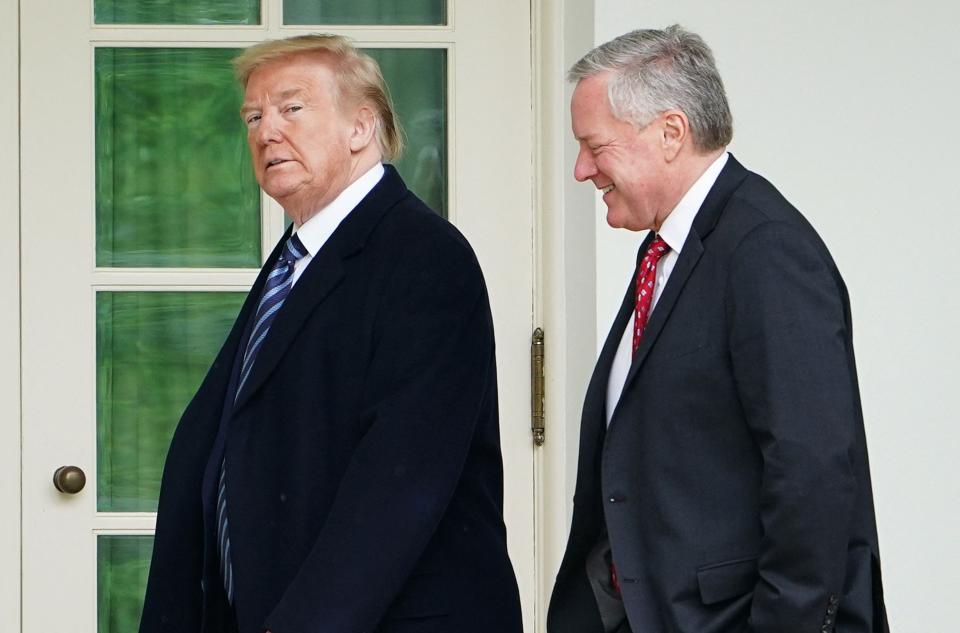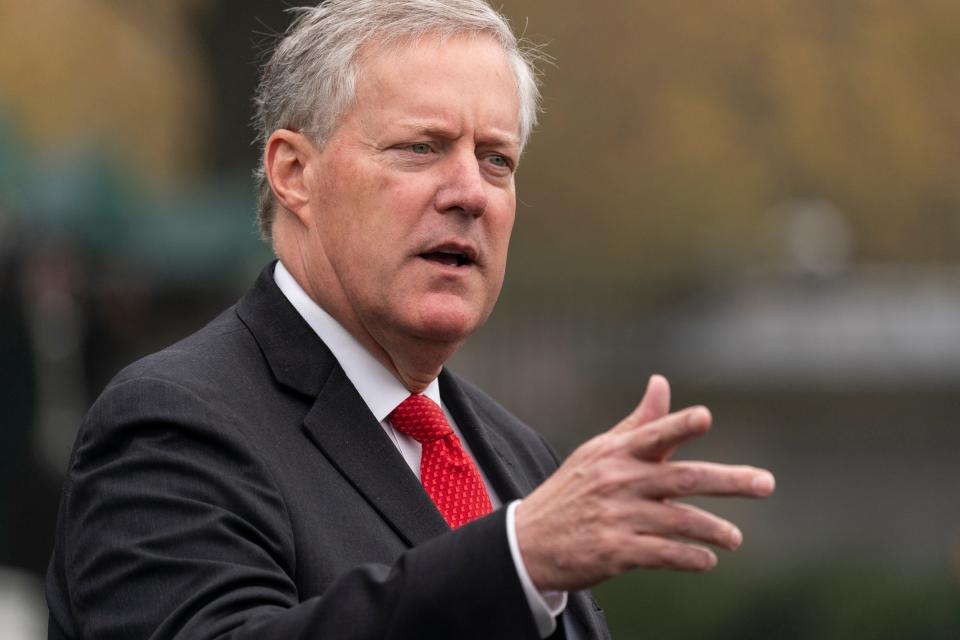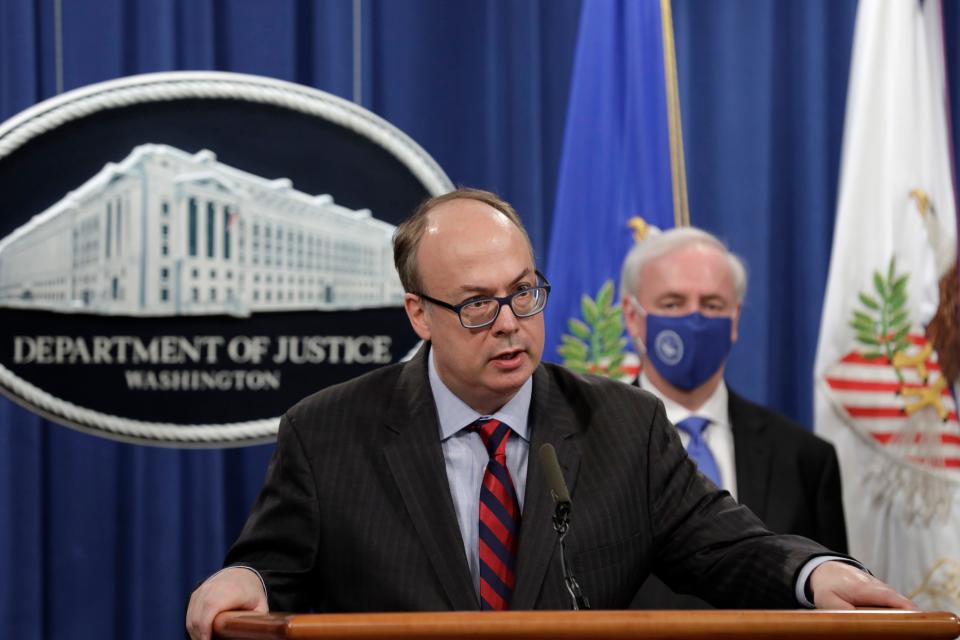Mark Meadows testifies Georgia election call 'part of my role' in Trump White House
- Oops!Something went wrong.Please try again later.
- Oops!Something went wrong.Please try again later.
- Oops!Something went wrong.Please try again later.
ATLANTA – Mark Meadows testified Monday in federal court that his job as Donald Trump’s White House chief of staff was so wide-ranging that he routinely called officials about issues such as the withdrawal from Afghanistan or at-home COVID-19 tests, along with results of the 2020 election.
“I certainly believed it was part of my role,” Meadows said at the hearing before U.S. District Judge Steve Jones.. “Serving the president of the United States, and I want to be clear with his honor, takes all kinds of forms.”
Jones held the hearing to gather evidence about Meadows’ request to move his criminal racketeering charges with Trump from Fulton County Superior Court to federal court.
Meadows’ lawyers argued that his federal job protected him from state-level charges. During his testimony, Meadows also disputed two acts described in the indictment as part of his participation the alleged criminal enterprise. He denied asking a Trump political aide for a memo and he said a text allegedly sent to one Georgia official was sent to another person.
One of Meadows' lawyers, George Terwilliger, said the decision to move the case to federal court “is at the lowest evidentiary burden you can imagine."
“If he went out and shot a protester in Lafayette Park, that would obviously be a violation,” Terwilliger said.
Prosecutors in Fulton County District Attorney Fani Willis' office contend Meadows couldn’t be acting under his federal authority because federal law bars officials from working on politics.
“Mr. Meadows came before the court today unprepared to define his duties,” Francis McDonald Wakeford said. “The scope of government duties ends when you reach political activities.”
Jones said he needed to take some time to reach a decision because it could set a precedent. He said if he hasn't ruled by Sept. 6, that Meadows would have to be arraigned.
The decision could have broad impact. Four other co-defendants have also asked to move their cases from state to federal court. Meadows has asked for his charges to be dismissed in federal court.
Here is what we know about the case:

What did lawyers argue about Meadows' role?
Meadows is charged with racketeering and soliciting Georgia Secretary of State Brad Raffensperger to violate his oath of office for participating in Trump's call Jan. 2, 2021, asking to "find" enough votes for him to win the state.
Raffensperger testified the call sounded like a campaign call rather than from government officials.
“Those were Trump campaign lawyers, so I thought it was a campaign call,” Raffensperger said of participants on the call.
Terwilliger walked Meadows through his duties as chief of staff, setting appointments, arranging calls and setting time limits on meetings. Terwilliger asked about actions Meadows took that are cited in the indictment, including traveling Dec. 22, 2020, to the Cobb County Civic Center to try to observe an audit of ballot signatures or sending texts to investigators who monitored the election.
In each case, Meadows said he engaged in the activity in his role as chief of staff. He said he considered ensuring fair elections part of his job.
“I thought there were additional things that needed to be investigated,” Meadows said.
Anne Cross, one of the prosecutors, asked Meadows whether Trump ever asked him to do something outside his role.
“I don’t know that I did anything outside the scope of my role as chief of staff that we’ve discussed here today,” Meadows said. “I can’t come up with an example.”

Judge questions Meadows about role as chief of staff
Jones, the judge, asked Meadows about the extent of his role under Article 2 of the Constitution, which set up the executive branch. But Meadows said he wasn’t learned enough to say.
Jones also asked what kinds of communications Meadows would have with state officials.
Meadows said he routinely spoke with governors and secretaries of agriculture about subjects other than the election. Meadows said he would call other officials about issues such as the withdrawal from Afghanistan or at-home COVID-19 tests.
“There were times when I felt like my phone number was plastered over every bathroom in America,” Meadows said. “The phone calls just kept coming.”
What does the indictment say about Meadows?
The indictment cites several steps in addition to the Raffensperger call that Meadows took to try to overturn the election.
Meadows joined Trump in asking political aide John McEntee sometime during December 2020 to prepare a memo outlining the strategy for Vice President Mike Pence, in his role as Senate president, to reject electoral votes from certain states during the congressional count on Jan. 6, 2021, and returning them to state legislatures. Pence refused to participate.
Meadows denied under oath Monday asking for the memo.
“When this came out in the indictment, it was the biggest surprise for me,” Meadows said. “Me asking Johnny McEntee for this kind of a memo just didn’t happen.”
Meadows visited the Cobb County Civic Center in Georgia on Dec. 22, 2020, seeking to observe the audit of ballot signatures being performed by the Georgia Bureau of Investigation and the secretary of state’s office. Local officials prevented him from viewing the audit, which was not open to the public.
The next day, Meadows arranged for Trump to call Watson and claim he won the state “by hundreds of thousands of votes,” according to the indictment. Trump told Watson that “when the right answer comes out you’ll be praised,” according to the indictment.
Meadows sent Watson a text on Dec. 27 asking if there was “a way to speed up Fulton county signature verification” if the Trump campaign provided financial assistance, according to the indictment.
Meadows testified Monday he didn't text Watson, but rather Jordan Fuchs, the secretary of state’s chief of staff.

What is each side arguing about a move to federal court?
Meadows' lawyers contend the Constitution’s supremacy clause protects federal officials from state-level charges while carrying out their duties of office. The lawyers cited a Supreme Court decision in 1890 about the provision that prohibited “suits under state law against federal officials carrying out their executive duties.”
Meadows' lawyers also argued that the allegations in the indictment such as visiting a Cobb County vote-auditing site and setting up a presidential phone call aren’t illegal.
"The State’s prosecution of Mr. Meadows threatens the important federal interest in providing the President of the United States with close, confidential advice and assistance, firmly entrenched in federal law for nearly 100 years," Meadows' lawyers said in one filing.
But Willis called the request "meritless" and "futile." She argued that Meadows acknowledged his activities cited in the indictment were political rather than official duties of his post.
"Having admitted that all of his pertinent activity is political, the defendant has acknowledged that all of the activity falls outside the scope of his duties and his 'color of office' because he could never, as Chief of Staff, engage in such political activity without violating a federal statute," Willis wrote in her argument. "The defendant fails to satisfy the first requirement for removal because he has stated his actions are, by definition, of a type that can never be taken 'under color of office,' or even bear a 'connection' or 'association' to such office. The inquiry can end there."
Meadows disputed that his actions were political − and said it wouldn't matter if they were.
"While the state's characterization of Mr. Meadows's conduct and official duties are largely irrelevant at the removal stage, they are also wrong," his lawyers Terwilliger, John Moran and Michael Francisco said in a filing. "Neither the duties of the Chief of Staff nor the laws and Constitution of the United States draw a clean line between federal authority, on the one hand, and elections and politics, on the other."

Jeffrey Clark, David Shafer, Shawn Still, Cathy Latham also asked to move cases
Five co-defendants including Meadows have each argued the Constitution protected them from state prosecution for carrying out their official duties.
Jeffrey Clark, a former assistant attorney general, was charged wtih attempting to make false statements for drafting a letter misstating Justice Department findings about Georgia's election.
David Shafer, the Georgia Republican Party chairman, faces eight charges including for being an alternate elector and allegedly making false statements.
Shawn Still, who is now a state senator, faces seven charges related to being an alternate elector.
Cathy Latham faces 11 charges related to being an alternate elector and for conspiracy to allegedly tamper with Coffee County election equipment.
Clark drafted the letter on Dec. 28, 2020, for acting Attorney General Jeffrey Rosen to sign and send to Georgia Gov. Brian Kemp and legislative leaders. The letter falsely said the department “identified significant concerns that may have impacted the outcome of the election in multiple States, including the State of Georgia,” according to the indictment.
Clark’s lawyer, Harry MacDougald, called the accusations “scurrilous.”
Shafer argued that serving as a Republican presidential elector chosen in March 2020, he was a federal official acting in his official capacity. He seeks to present several federal defenses to his actions, including official immunity, supremacy clause immunity and the First Amendment.
“Neither the state of Georgia nor any of its localities has the authority to prosecute Mr. Shafer for these actions, and this Court should exercise its clear authority to correct this injustice and halt this unlawful and unconstitutional attempted prosecution now,” his lawyers Craig Gillen and Holly Pierson wrote.
Still described himself as the owner of his family's pool construction business in the Atlanta area who was chosen as a Republican presidential elector in March 2020, months before the election. Still said he relied on lawyers who told him to meet with Shafer and other alternate electors in case Trump's legal challenges were upheld in court.
"Thus, Mr. Still, acting as a presidential elector, was a federal officer," his lawyer, Thomas Bever, said in a court filing. "Mr. Still, as a presidential elector, was also acting at the direction of the incumbent President of the United States."
Latham was another alternate elector who is also charged with several conspiracy counts dealing with the alleged tampering with Coffee County election equipment. She also argued her post as elector protected her from local prosecution.
"The purpose of the statute is to protect federal officers from interference by hostile state courts, and to provide a federal forum where the officers must raise defenses arising from their official duties, and where they can receive a fair trial on the merits free from local interests or prejudice," her lawyer, William Cromwell, wrote in a court filing.
This article originally appeared on USA TODAY: Mark Meadows testifies Georgia charges target official federal duties

